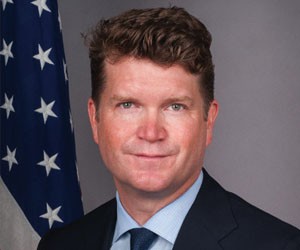
About the Author
U.S. Ambassador to the United Kingdom
Welcome from Matthew Barzun, U.S. Ambassador to the United Kingdom
The U.S.-U.K. relationship has grown strong over the years with the help of its many patron saints. There are the obvious ones – Churchill, FDR – and the famous ones, such as John Lennon and Steven Spielberg. There are also the many thousands of lesser-knowns, especially those engaged in the ceaseless back-and-forth of goods, ideas and investment, who too deserve their proper place in the pantheon.
This all crystallized in my mind on a recent trip to Hull. I was sitting on a train – the British invention
that transformed trade and travel and was embraced and exploited very early in the United States. In
my hand was an iPhone, another revolutionary advance, this time created by Americans with its iconic
appearance designed by an Englishman.
I used the Internet, the 20th century equivalent of the train, this time founded by an American and
adopted early in the U.K., and went on to the World Wide Web (we too often forget the two are
separate inventions), which was developed by a Brit and commercialized by an American.
I looked up Hull on Wikipedia – a site developed by an American who now lives in London – and
found that John Venn, father of the Venn diagram, was born there. In the midst of all these examples
of special relationship patron saints and powerful transatlantic overlap, came the name of the very
man whose model lets us best appreciate them. So I want to add him to the list (it is the least I could
do for the man, since I use Venn diagrams so much that I probably owe him royalties).
Not only did Venn give the world an accessible but powerful tool for simplifying complexities and
focusing energies, his invention is also the best way to illustrate why our two nations flourish together.
Imagine a diagram that illustrates international trade and investment and the opportunities for
growth. There are two overlying circles, one labeled, “Countries You Need To Work In” and the other,
“Countries You Want To Work In.”
You need to work in those places that have great purchasing power and impressive market
opportunities. Maybe even a prime location for expansion into the rest of the region. These
opportunities are a must-do – or at least a must-try. You may not want to have an operation there,
but you see it as a fact of life in the globalized marketplace.
And then there is the set of markets where you want to be. This is where you find shared business
and commercial practices, advanced infrastructure, innovation and creativity. Beyond this are the
substantive elements such as rule of law, anti-corruption measures, intellectual property protection,
and contracts that are rigorously enforced – and where trade barriers are fair or non-existent and
there is no investor discrimination. It is here too that you find the most valuable commodity in
business: “trust”.
So where our two circles – where you need to be and where you want to be – intersect is incredibly
fertile territory. And right in the center of that overlap sit the United States and the United Kingdom.
That is why you already get remarkable transatlantic trade and investment cooperation.
We are very well positioned for mutual benefit, and good things will continue to happen as long
as we do our jobs. It is government’s job to nurture those things that make our countries “want”
opportunities. It is business’ job to seize them on behalf of customers and shareholders.
BritishAmerican Business (BAB) is a key partner in this endeavor, providing a great forum for
building networks and relationships, exchanging ideas and promoting business interests with both
governments. If we can we stay focused and work together, we will keep the center of our Venn diagram
vibrant, vital, and vast.